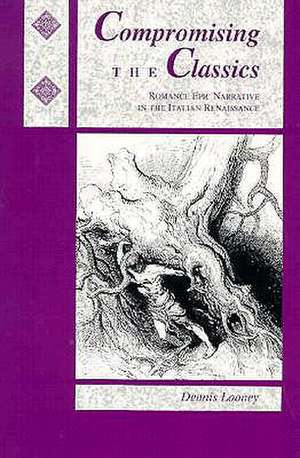Compromising the Classics: Romance Epic Narrative in the Italian Renaissance
Autor Dennis Looneyen Limba Engleză Hardback – 31 aug 1996
Preț: 321.72 lei
Nou
Puncte Express: 483
Preț estimativ în valută:
61.58€ • 63.46$ • 51.99£
61.58€ • 63.46$ • 51.99£
Carte indisponibilă temporar
Doresc să fiu notificat când acest titlu va fi disponibil:
Se trimite...
Preluare comenzi: 021 569.72.76
Specificații
ISBN-13: 9780814326008
ISBN-10: 0814326005
Pagini: 244
Dimensiuni: 159 x 234 x 21 mm
Greutate: 0.64 kg
Ediția:New.
Editura: Wayne State University Press
ISBN-10: 0814326005
Pagini: 244
Dimensiuni: 159 x 234 x 21 mm
Greutate: 0.64 kg
Ediția:New.
Editura: Wayne State University Press
Textul de pe ultima copertă
Compromising the Classics examines the evolution of narrative poetics in three of the canonical poems of the Italian Renaissance, the romance-epics of Boiardo, Ariosto, and Torquato Tasso. Combining cultural criticism with literary analysis, this volume focuses on how these poets renovated the popular genre of romance into a new kind of narrative through their imitation of classical epic, as well as through their imitation of pastoral, satire, history, and to a lesser extent, comedy and tragedy. Looney illustrates how the three great Renaissance poets from Ferrara are products of a cultural milieu which literary historians have typically ignored. Through these poets, who sought to incorporate details of classical literature into their idiom, Looney analyzes the impact of Renaissance humanism on popular culture. Specifically, the book tracks the way in which Ariosto's allusions to certain classical works shaped the patterning of his Orlando Furioso (1532), so that from one perspective it resembles a classical narrative, while from another, a medieval romance. Ariosto's intertextual allusions to classical sources often promoted a reevaluation of those models in terms of his own vernacular tradition and affected how his contemporary readers responded to classical literature. The same can be said of Tasso and Boiardo. Indeed, one of the most important contributions of Compromising the Classics is the introduction and illumination of Boiardo's work, about which critics have said virtually nothing. In contextualizing this unwarranted neglect, Looney notes both Ariosto's stunning literary success and Tasso's theoretical positions as primary contributors to the eclipse of Boiardo.
